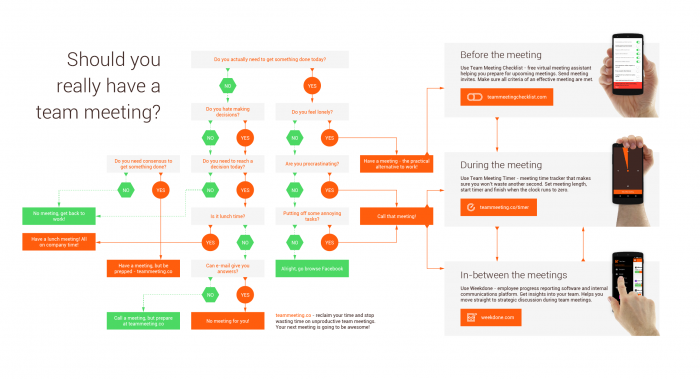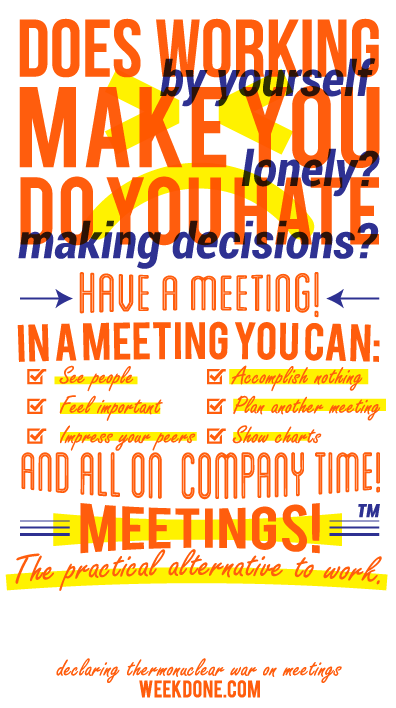Having an effective team meeting should not be rocket science. Yet, every now and then you probably attend another unproductive team meeting. Although we can’t bring your time back, we can make sure you’ll never waste it again.
How you might ask?
Productive meetings are a mix of good preparation, will-power, and efficient tools. Will-power is something you need to work out yourself, but we can help out with the other two components. As a result of research and brainstorming sessions, we are proud to present the Team Meeting Checklist. It’s a fun interactive tool for anyone who wishes to make meetings productive again. It demands only 4 little steps from your part:
Step 1. Go to teammeetingchecklist.com. Already easy, right.
Step 2. Write down the details about the upcoming meeting you wish to improve. Fill in the blanks with meeting date and time, location and objective. Add participants’ information and move on to the next step.
Step 3. Go through the effective meeting checklist, reminding yourself what makes a productive meeting. Check off all the items you know you can commit to.
Step 4. Send the information to meeting participants. Submit your invitation and the e-mail is automatically sent to every meeting participant. They will be notified about the meeting details and your commitment to an effective team meeting. The social pressure will make sure you’ll stick to your promises.
Overall, you’ll improve the productivity and time spent on the meeting. Use the tool before each meeting; reminding participants about:
- when and where the meeting takes place;
- the overall objective;
- the guidelines you and everyone else should follow;
- commitment to waste no more time on unproductive meetings.
After each meeting, come back to the meeting invitation e-mail and reflect. In order to continuously improve, reflect on your progress. Analyze whether you were truly able to stick to the guidelines you checked off. Better yet, ask feedback from your team members. Ask their opinion whether you followed the promised checklist and what could be improved next time. This will show your true commitment to honor yours and everyone else’ time.
Meetings around the world are held differently. Nonetheless, a lot of rules apply to every situation. To get maximum out of your meetings, be sure to follow this list of rules (30 guidelines).
List of Rules:
Before the Team Meeting:
- Define a clear objective
- Determine necessary participants
- Set meeting time
- Set meeting location
- Prepare meeting agenda
- Distribute the agenda to meeting participants
- Distribute all other background material
- Make sure the meeting room is prepped and ready
During :
- Make sure the meeting starts on time
- Establish meeting ground rules
- Review the meeting agenda
- Clarify the meeting purpose
- Put the meeting agenda on a screen
- Make sure the agenda is followed
- Discuss one topic at a time
- Make sure one person has the floor at a time
- Keep discussions relevant
- Wrap-up each agenda item out loud
- Follow the time schedule
- Give every team member the chance to express an opinion
- Use open-ended questions
The outcome of the team meeting:
- Make progress toward the objective
- Summarize important discussions and decisions
- Document responsibilities, assigned tasks, and deadlines
- Announce date, time and place for the next meeting
- End team meeting on time
- Make sure everyone leaves the room knowing the next step
After
- Send a follow-up memo within 24 hours
- Make sure delegation decisions are followed-up
- Put any unfinished business up on the agenda for the next team meeting
There you have it. 30 most important guidelines to hold better, more effective team meetings. Now let me ask, how many of these guidelines are you following on regular bases?
To keep these tips always near, make sure to download or print out the checklist.
Before calling in another team meeting, follow these instructions beforehand.
Still not convinced?
Here’s how we declared all offensive war on inefficient Team Meetings
Over the past years, we’ve written quite a lot about team meetings. But it wasn’t until recently, we really took matters into our own hands and declared war on inefficient team meetings.
Trying to put a stop to mindless resource wasting, let’s take a look back at what we’ve already covered:
- It all started with the death of the status meeting. Since with the use of Weekdone’s employee progress reports, the need to hold weekly update meetings has decreased considerably.
- As a matter of fact, we’ve tried teamwork without meetings ourselves.
- We can say it from our experience that teamwork without meetings is possible, at least for a short time. Nonetheless, team meetings can be immensely valuable when conducted in a right way. Here’s how a team in the Whole Foods Market improved their meetings by using weekly reports.
- Actually, as the Whole Foods Market case study points out, it is possible to save your team meetings with status reports.
- Although meeting practices vary across the globe, there is a similar denominator. No matter where you are located, there’s a great risk you might be wasting your time on team meetings.
- In the U.S. office workers spend an average of 4 hours per week in meetings, more than half of that time is wasted. Therefore, employees in the U.S. waste average 2.5 hours a week that costs businesses 37 billion dollars a year.
- In the UK workers waste 2 hours and 39 minutes in meetings every week, and it’s costing businesses an estimated 26 billion pounds a year.
- In Australia it is estimated that the employees waste around 2,6 hours a week to unproductive meetings, resulting in a 20 billion dollar loss.
- That’s why a lot of big companies have done their best to make meetings suck less.
- We’ve even piled up a list of rules you should follow for effective team meetings. It’s no brain surgery, but I can bet there are few guidelines that slip your mind.
Are you ready to jump on board and join the revolution? Join us to declare war against inefficient team meetings? Take a look at the free Team Meeting Toolbox and you’ll find a solution to stop inefficient meetings. Your next team meeting is going to be awesome.


